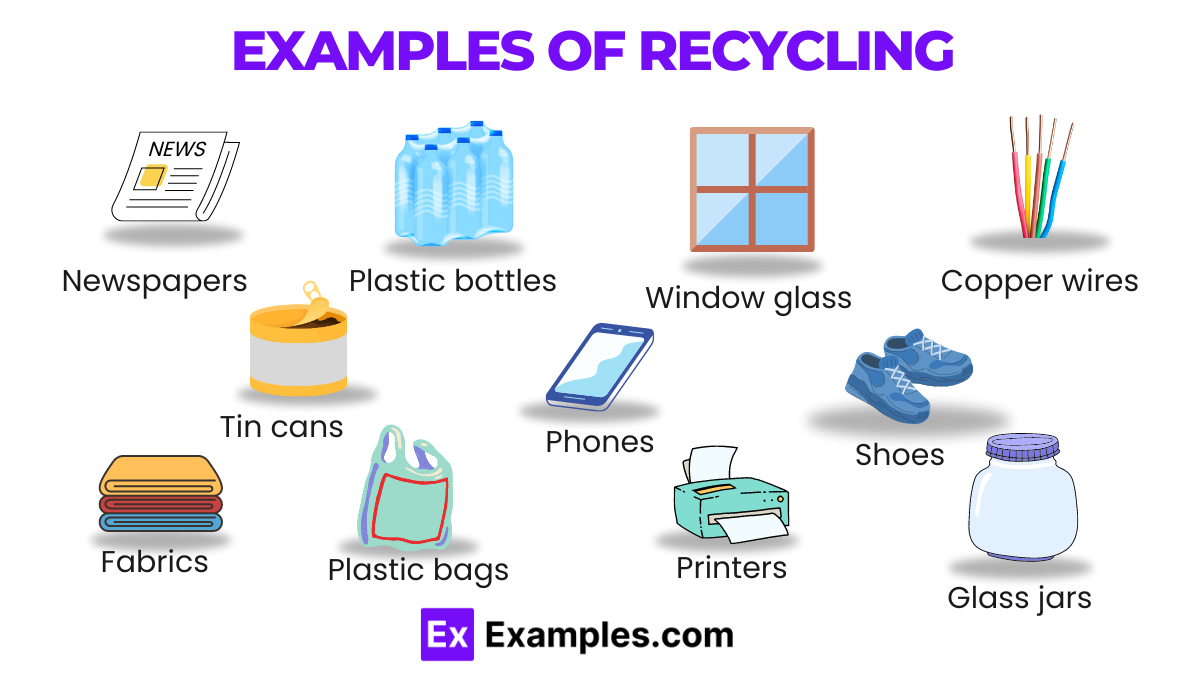What is the primary purpose of recycling?
To increase waste
To reduce the need for new raw materials
To consume more energy
To decrease product lifespan


Recycling is the process of collecting and processing materials that would otherwise be discarded as waste, and transforming them into new products. This environmentally friendly practice conserves natural resources, reduces landfill waste, saves energy, and minimizes pollution. Commonly recycled materials include paper, cardboard, glass, metals, and certain plastics. By turning waste into valuable resources, recycling plays a crucial role in promoting sustainable living and protecting our planet for future generations.
Recycling converts waste into reusable materials, reducing the need for fresh resources and lowering pollution. By recycling paper, glass, plastic, and metals, we conserve resources, reduce landfill waste, and support environmental sustainability. Proper sorting and cleaning of recyclables are essential. Recycling helps preserve the environment and promotes a circular economy where resources are continually reused.

Recycling involves several essential steps to convert waste materials into reusable products. Here’s a breakdown of the recycling process:
Recyclable materials are collected from homes, businesses, and public recycling bins. This can be done through curbside collection programs, drop-off centers, or deposit/refund schemes.
Collected materials are transported to a recycling facility, where they are sorted by type. Advanced technology like conveyor belts, magnets, and optical scanners help separate paper, plastics, metals, and glass efficiently.
Sorted recyclables are cleaned to remove contaminants such as food residue, labels, and adhesives. This ensures the materials are pure and can be processed into high-quality products.
Cleaned materials undergo processing to be transformed into raw materials. For example:
Processed raw materials are sold to manufacturers who use them to create new products. This step completes the recycling loop, transforming waste into new items like bottles, cans, paper products, and more.
Consumers play a critical role by purchasing products made from recycled materials. This creates demand for recycled goods, encouraging more recycling and supporting the market for recyclable materials.
| Aspect | Reuse | Recycle |
|---|---|---|
| Definition | Using an item again for its original purpose or a new one. | Processing materials to create new products. |
| Process | Direct use of items without altering their form. | Breaking down items into raw materials to produce new items. |
| Environmental Impact | Reduces waste and conserves resources directly. | Reduces waste, conserves resources, but requires energy to process. |
| Examples | Using glass jars for storage, donating clothes. | Melting plastic bottles to make new plastic products. |
| Cost | Often low or no cost. | Can involve significant costs for collection, sorting, and processing. |
| Energy Use | Minimal, as no processing is needed. | Requires energy to convert items into raw materials and new products. |
| Longevity | Extends the life of the original item. | Converts items into new products, potentially multiple times. |
| Economic Impact | Can save money by reducing the need to buy new items. | Can create jobs and industries in the recycling sector. |
Recycling plays a vital role in environmental sustainability and offers numerous benefits:
Common recyclables include paper, cardboard, glass, metals (aluminum, steel), certain plastics, and electronics.
Recycling reduces greenhouse gas emissions, conserves natural resources, and decreases the amount of waste in landfills.
Single-stream recycling allows all recyclables to be placed in one bin, simplifying the recycling process for consumers.
Not all plastics are recyclable. Check local guidelines, as some plastics, like Styrofoam, are often excluded.
Recyclables are sorted, cleaned, and processed into raw materials that can be used to manufacture new products.
Many communities offer electronic waste (e-waste) recycling programs. Check with local recycling centers for specific guidelines.
Rinsing removes food residue, which can contaminate recycling streams and reduce the quality of recyclable materials.
Yes, glass can be recycled infinitely without losing quality or purity, making it highly sustainable.
Recycling creates jobs, reduces waste management costs, and generates revenue from the sale of recycled materials.
Educate others about the benefits of recycling, provide convenient recycling options, and lead by example.
Text prompt
Add Tone
10 Examples of Public speaking
20 Examples of Gas lighting
What is the primary purpose of recycling?
To increase waste
To reduce the need for new raw materials
To consume more energy
To decrease product lifespan
Which of the following materials is commonly recycled?
Food scraps
Glass bottles
Plastic bags
Broken electronics
What does the recycling symbol with three arrows represent?
Reduce, Reuse, Recycle
Reuse, Recycle, Recover
Recycle, Reuse, Refuse
Recycle, Reduce, Recover
Which material should not be placed in a standard recycling bin?
Aluminum cans
Paper products
Food-soiled pizza boxes
Plastic bottles
Why is recycling important for conserving energy?
It uses more energy than creating new products
It reduces the need for energy-intensive raw material extraction
It does not affect energy consumption
It increases overall energy consumption
What is a common barrier to effective recycling?
Overabundance of recyclables
Lack of awareness about recycling
Excessive recycling facilities
High cost of recycled materials
Which type of plastic is most commonly recycled?
Polyethylene terephthalate (PET)
Polyvinyl chloride (PVC)
Polystyrene (PS)
Polycarbonate (PC)
What is the main challenge in recycling electronic waste (e-waste)?
High cost of recycling
Difficulty in separating valuable metals
Lack of electronic products
High energy consumption
How does recycling contribute to reducing greenhouse gas emissions?
By increasing waste production
By reducing the need for new materials and energy consumption
By promoting industrial pollution
By consuming more fossil fuels
Which of the following items is typically composted rather than recycled?
Glass jars
Food scraps
Aluminum cans
Plastic containers
Before you leave, take our quick quiz to enhance your learning!

